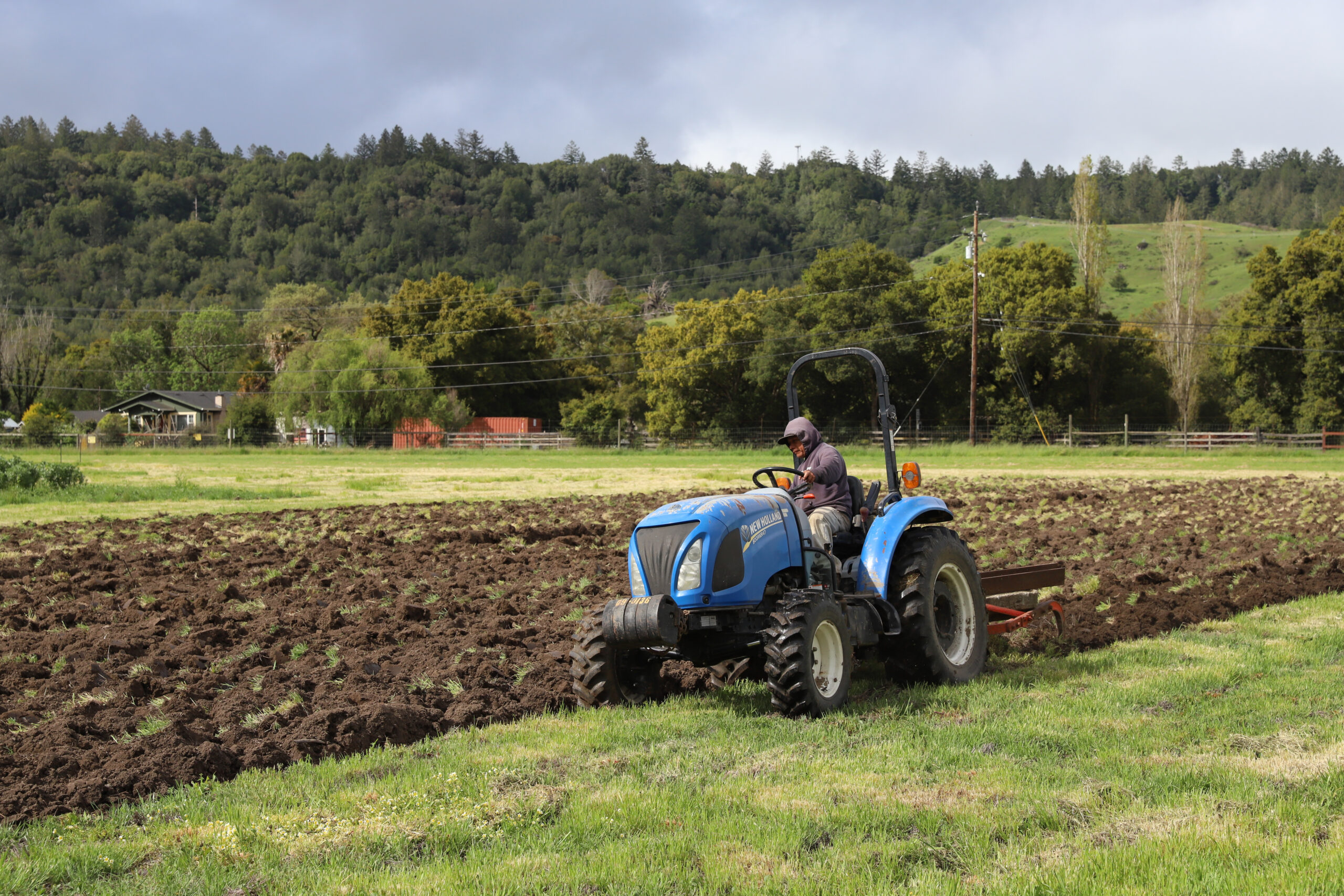Chances are Janet Brown and Marty Jacobson know more about heirloom tomatoes than you do. The husband-and-wife team behind Allstar Organics has been growing the vibrantly colored nightshade fruit in the unincorporated Marin County community of Nicasio for 30 years—long before heirloom tomatoes became common in this country.
Back in the 1990s, when heirloom tomatoes were not familiar to many Americans—even trendsetting San Franciscans—Brown said she had trouble selling local grocers on the idea of stocking the often-lopsided varietal. But she eventually succeeded with the century-old Woodlands Market, her first big customer.
“I handed the produce manager a copy of Martha Stewart Living magazine and turned to a page about heirlooms, and he said, ‘I’ll take everything you got,’” she remembered with a laugh.
Brown, who grew up in a house of antique collectors and gardeners, said she learned early on about heirloom varieties. Even before Allstar Organics was officially founded, she bought heirloom seeds from Italy and planted them in the ground outside her house.
Beginning as a small plot of land outside Brown and Jacobson’s home in Lagunitas, Allstar Organics helped introduce heirloom tomatoes to the Bay Area in the 1990s. Brown told The Standard that few people in Marin County had even heard of the non-hybrid variety back then.
“I had never seen one, never eaten one, but I was just banking on this,” she said of betting the farm—literally—on heirloom tomatoes. “And it worked out.”
Consumers can now find heirloom tomatoes in the produce section at their local Safeway or Trader Joe’s. However, climate change—coupled with the impact of the pandemic and its aftermath—has created a new set of challenges for Allstar Organics.
Drought, Deluge and the Pandemic
Despite being pioneers of farm-to-table produce—the Michelin-starred Quince as well as Flour + Water, Pizzeria Delfina and several other such restaurants make up a large swath of Brown and Jacobson’s customer base—things have not been easy of late for Allstar Organics.
Last year, Brown and Jacobson found themselves at a crossroads. Season after season of drought conditions had left them with few options but to temporarily relocate from Nicasio to Petaluma for the summer.
The farm, which comprises 14 acres between this plot on the Lafranchi Ranch in Nicasio and a second plot in Point Reyes, relies on water from a well located a mile and a half away from the fields in Nicasio. During the dry summer months, it lacked the water pressure necessary to produce an adequate yield. Last June, water from the well was coming in at a trickle, effectively halting its growing season.
“Farming is so brutally subtle,” Jacobson said.
But this year, as part of a drought resilience initiative, Brown and Jacobson are taking a large step in confronting the ongoing impacts of climate change by implementing a tank and pumping system with $15,000 in support from the Marin Agricultural Land Trust that will enable them to continue growing through the summer.
As Brown and Jacobson told The Standard, the challenges wrought by the water shortage were only compounded during the pandemic.
When Covid sidelined in-person dining, Allstar Organics found a lifeline in a community-supported agriculture (CSA) produce box program launched by the farm’s distributor, the Farmers Exchange of Earthly Delights (FEED) Cooperative. According to Brown, the farm is still recovering from that pandemic pause.
“It was like crawling your way out of a huge hole,” she said.
That was, in large part, because the farm crew continually ran out of water but had to keep picking, so Allstar Organics ended up with half as many tomatoes, its signature crop. Meanwhile, Brown and Jacobson said they were paying around $1,000 per week for water.
Some might assume that this past winter’s heavy rains would have been a welcome change at the farm, but Brown said that the unprecedented weather actually set them back a month because they were waiting on crop starters from rain-inundated farms in Gilroy and Salinas.
Back to the Land
Allstar Organics also cultivates sweet Kelsae onions, which originated in Western Europe and are still rare in the U.S., as well as hardneck garlic, which sends up an unusual flowering stalk, called a scape. Their record di Napoli butternut squash weighed a whopping 50 pounds, according to Jacobson.
These days, she said that most of their loyal customers tend to find them at the San Francisco farmers’ market at the Ferry Plaza.
The farm is a collaboration between Brown and Jacobson and another Marin County family. Walter Florencio and his sons, Jaime and Walter Jr., work the fields full-time.
Jacobson called the Marin Agricultural Land Trust’s drought resiliency grant the “divine intervention” his farm needed. This past Monday, Jacobson walked along the trellised rows of tomato plants and surveyed everything the farm had yielded in late June.
“Holy shit,” he said. “Those are tomatoes!”
In addition to heirloom, cherry and early girl tomatoes, on the heels of the summer solstice, the farm now boasts rows of peppers, beans, cucumbers, summer squash, sweet peas, winter squash and baby leeks.
The new water tank and pump have allowed Allstar Organics to operate on this plot through the summer for the first time. Brown said she’s heartened that local organizations like the land trust have taken notice of the climate challenges faced by small, independent farmers.
“We feel it’s important for people to see the land, so they can become engaged and motivated to invest in the future of agriculture,” Brown said.
Gesturing at the expanse of green beyond his box truck, Jacobson turned back and laughed.
“We’re ragged as hell, but we look good,” he said.
